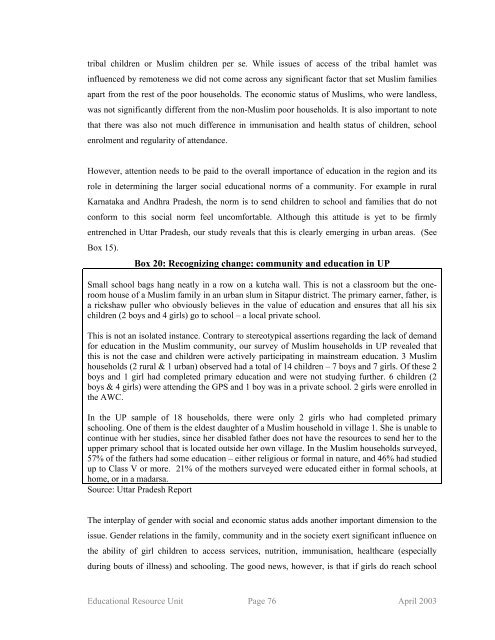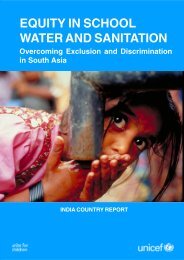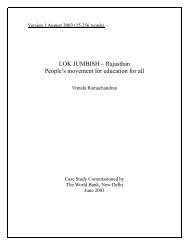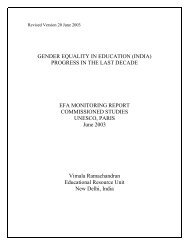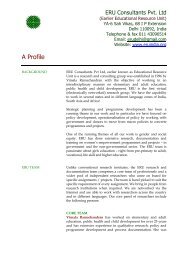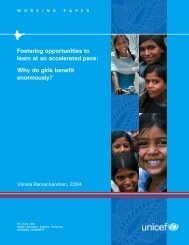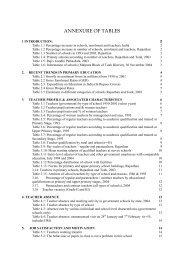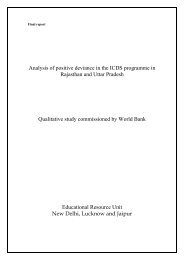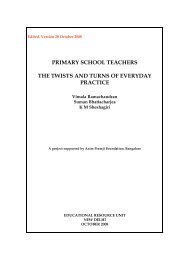Snakes and Ladders - ERU Consultants Pvt. Ltd.
Snakes and Ladders - ERU Consultants Pvt. Ltd.
Snakes and Ladders - ERU Consultants Pvt. Ltd.
Create successful ePaper yourself
Turn your PDF publications into a flip-book with our unique Google optimized e-Paper software.
tribal children or Muslim children per se. While issues of access of the tribal hamlet was<br />
influenced by remoteness we did not come across any significant factor that set Muslim families<br />
apart from the rest of the poor households. The economic status of Muslims, who were l<strong>and</strong>less,<br />
was not significantly different from the non-Muslim poor households. It is also important to note<br />
that there was also not much difference in immunisation <strong>and</strong> health status of children, school<br />
enrolment <strong>and</strong> regularity of attendance.<br />
However, attention needs to be paid to the overall importance of education in the region <strong>and</strong> its<br />
role in determining the larger social educational norms of a community. For example in rural<br />
Karnataka <strong>and</strong> Andhra Pradesh, the norm is to send children to school <strong>and</strong> families that do not<br />
conform to this social norm feel uncomfortable. Although this attitude is yet to be firmly<br />
entrenched in Uttar Pradesh, our study reveals that this is clearly emerging in urban areas. (See<br />
Box 15).<br />
Box 20: Recognizing change: community <strong>and</strong> education in UP<br />
Small school bags hang neatly in a row on a kutcha wall. This is not a classroom but the oneroom<br />
house of a Muslim family in an urban slum in Sitapur district. The primary earner, father, is<br />
a rickshaw puller who obviously believes in the value of education <strong>and</strong> ensures that all his six<br />
children (2 boys <strong>and</strong> 4 girls) go to school – a local private school.<br />
This is not an isolated instance. Contrary to stereotypical assertions regarding the lack of dem<strong>and</strong><br />
for education in the Muslim community, our survey of Muslim households in UP revealed that<br />
this is not the case <strong>and</strong> children were actively participating in mainstream education. 3 Muslim<br />
households (2 rural & 1 urban) observed had a total of 14 children – 7 boys <strong>and</strong> 7 girls. Of these 2<br />
boys <strong>and</strong> 1 girl had completed primary education <strong>and</strong> were not studying further. 6 children (2<br />
boys & 4 girls) were attending the GPS <strong>and</strong> 1 boy was in a private school. 2 girls were enrolled in<br />
the AWC.<br />
In the UP sample of 18 households, there were only 2 girls who had completed primary<br />
schooling. One of them is the eldest daughter of a Muslim household in village 1. She is unable to<br />
continue with her studies, since her disabled father does not have the resources to send her to the<br />
upper primary school that is located outside her own village. In the Muslim households surveyed,<br />
57% of the fathers had some education – either religious or formal in nature, <strong>and</strong> 46% had studied<br />
up to Class V or more. 21% of the mothers surveyed were educated either in formal schools, at<br />
home, or in a madarsa.<br />
Source: Uttar Pradesh Report<br />
The interplay of gender with social <strong>and</strong> economic status adds another important dimension to the<br />
issue. Gender relations in the family, community <strong>and</strong> in the society exert significant influence on<br />
the ability of girl children to access services, nutrition, immunisation, healthcare (especially<br />
during bouts of illness) <strong>and</strong> schooling. The good news, however, is that if girls do reach school<br />
Educational Resource Unit Page 76 April 2003


